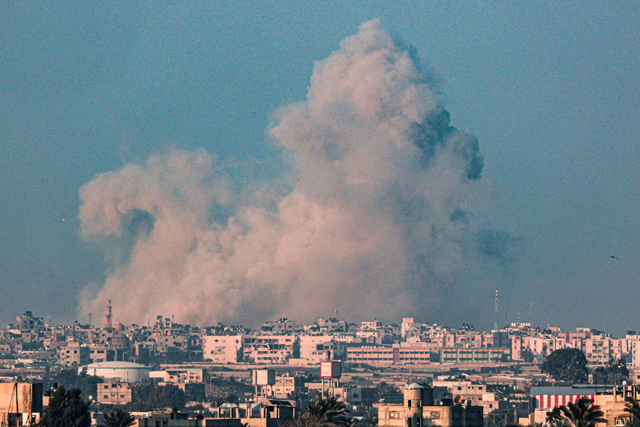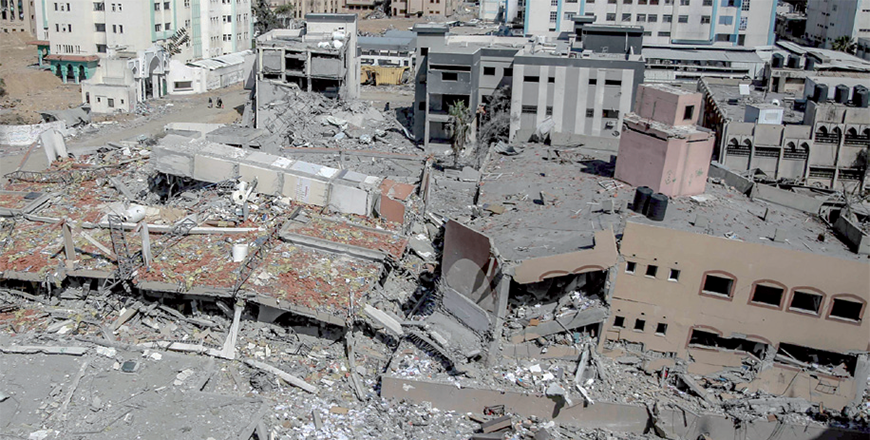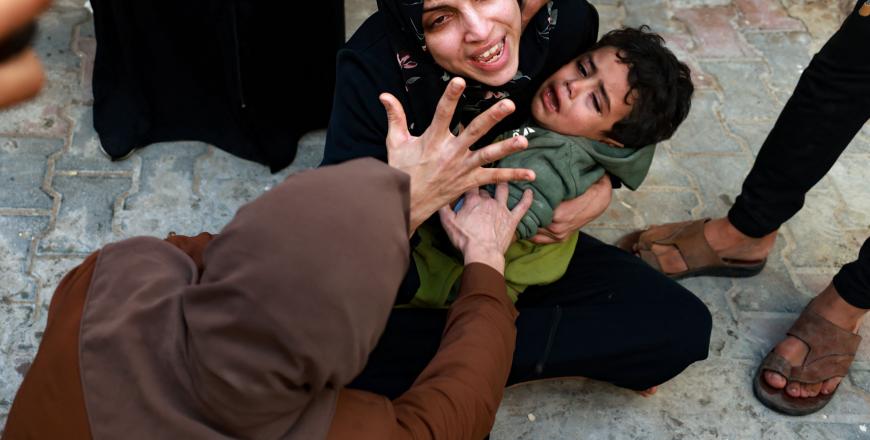You are here
Hunger grips war-torn Gaza as truce talks resume in Cairo
By AFP - Feb 22,2024 - Last updated at Feb 22,2024

A Palestinian man mourns as he holds the body of a child at Rafah's Al Najjar Hospital on Wednesday, following overnight Israeli air strikes on the southern Gaza Strip (AFP photo)
GAZA STRIP, Palestinian Territories — Heavy fighting rocked besieged Gaza on Wednesday as aid agencies warned of looming famine and new talks were held in Cairo towards an Hamas-Israel ceasefire and hostage release deal.
The White House sent Middle East envoy Brett McGurk for renewed talks involving mediators and Hamas, a day after a United Nations Security Council resolution calling for a ceasefire was blocked by the US.
Global concern has spiralled over the high civilian death toll and dire humanitarian crisis in the war sparked by Hamas's unprecedented October 7 surprise attack against Israel.
Combat and chaos again stalled the sporadic aid deliveries for desperate civilians in Gaza, where the UN has warned the population of 2.4 million is on the brink of famine and could face an "explosion" of child deaths.
The UN World Food Programme said it was forced to halt aid deliveries in north Gaza because of "complete chaos and violence" after a truck convoy encountered gunfire and was ransacked by looters.
Hamas called the move a “death sentence”.
More Israeli strikes continued to pound Gaza, leaving 103 people dead during the night, according to the health ministry in the Hamas-run territory, which put the overall death toll at 29,313.
Air strikes were ongoing into Wednesday evening in southern Rafah and Khan Yunis, according to an AFP correspondent.
Abdel Rahman Mohamed Jumaa said he lost his family in strikes on Gaza’s far-southern Rafah area.
“I found my wife lying in the street,” he told AFP. “Then I saw a man carrying a girl and I ran towards him and.... picked her up, realising she was really my daughter.”
He was holding a small shrouded corpse in his arms.
Rafah concerns
Particular concern has centred on the packed city of Rafah, where 1.4 million people now live in crowded shelters and makeshift tents, fearing attack by nearby Israeli ground troops.
Aid groups warn a ground offensive could turn Rafah into a “graveyard” and the United States has said the vast numbers of displaced civilians must first be moved out of harm’s way.
Palestinians in Rafah were digging new graves in the sand on Wednesday near a makeshift camp, with shrouded bodies carried on donkey-led carts.
Israeli prime minister Benjamin Netanyahu has insisted the army will keep fighting until it has destroyed Hamas and freed the remaining 130 hostages, around 30 of whom are believed to be dead.
The war started when Hamas launched its unprecedented surprise attack on October 7, which resulted in the deaths of about 1,160 people in Israel, mostly civilians, according to an AFP tally of official Israeli figures.
Hamas also took about 250 hostages, many of whom were released during a week-long truce in late November.
Israel has heavily bombed Gaza since and launched a ground invasion that has seen troops and tanks push through from the north towards the south, leaving vast swathes entirely destroyed and many people struggling to find basic supplies.
One sewing workshop in Rafah said it has started to use medical cotton, gauze and lab coats to sew makeshift diapers, each made by hand — but warned their capacity is far from enough to meet the demand.
“I don’t have money to provide food, so how can I provide diapers for her?” said mother Hanan Al Bahtiti, adding that her baby daughter gets painful skin rashes.
“She screams in pain and I cry when I see her like this,” she told AFP.
New truce talks
Concern also remained high around Nasser Hospital in the heavily-bombarded southern city of Khan Yunis, where the World Health Organisation has called the devastation “incredible”.
The UN agency managed to evacuate some 32 patients from the besieged hospital, which was raided by Israeli troops last week.
It called the situation in Gaza “inhumane”, saying the territory had become “a death zone”.
McGurk, the White House coordinator for the Middle East and North Africa, was in Egypt as part of efforts to advance a hostage deal, before heading to Israel Thursday.
Hamas chief Ismail Haniyeh was already in Cairo for talks, the militant group said.
Qatar and Egypt have proposed a plan to free hostages in return for a pause in fighting and the release of Palestinian prisoners, but Israel and Hamas have so far failed to agree on a deal.
McGurk will hold talks “to see if we can’t get this hostage deal in place”, US National Security Council spokesman John Kirby told reporters.
Washington has argued that approving the UN resolution on Tuesday would have imperilled ongoing efforts to free hostages, after it vetoed an Algeria-drafted resolution demanding an immediate humanitarian ceasefire and the release of all hostages.
Hamas said the US veto amounted to “a green light for the occupation to commit more massacres”.
Related Articles
GAZA STRIP, Palestinian Territories — Israel's prime minister said on Sunday a potential ceasefire in its war against Hamas fighters would o
GAZA STRIP, Palestinian Territories — Israel said it had taken 100 people into custody at one of Gaza's main hospitals on Saturday
Gaza Strip, Palestinian Territories – Intense fighting erupted once again in Gaza on Friday as a week-long truce expired and Israel resumed



















